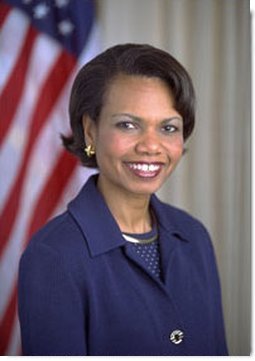|
Home >
News & Policies >
Policies in Focus
For Immediate Release
WASHINGTON -- The coalition that is currently engaged in the hard, dangerous work to disarm Iraq is strong, broad and diverse. Nearly 50 nations are committed to ridding Saddam Hussein's regime of all its deadly, destructive and illegal weapons. To put this in perspective, the combined population of coalition countries is approximately 1.23 billion people, with a combined gross domestic product of approximately $22 trillion. These countries are from every continent on the globe, representing every major race, religion, and ethnicity in the world. Diverse as this coalition is, each member shares a common goal. We seek nothing less than safety for our people. Many members have suffered from terror themselves; all understand the awful price of terrorism and the potentially catastrophic danger from weapons of mass destruction. But, vitally, all have the will to face the gravest threat of our time -- the nexus between outlaw regimes, weapons of mass destruction, and terrorism. The world has seen what happens when countries that recognize emerging or present threats lack the will to meet them. Many times in the last century -- and as recently as the last decade -- the world failed to act in time to prevent a crisis or meet a threat. Some of the members of this current coalition had to live with the deadly and dreadful consequences of that failure for decades. Some have only recently emerged from tyrannies imposed in no small part because of that failure. Months ago, the prime minister of Estonia told President Bush that he did not need an explanation of the need to confront Iraq. Because the great democracies failed to act in 1930s, his people lived in slavery for 50 years.
Many more countries are providing supplies, logistical and intelligence support, basing and over-flight rights, and humanitarian and reconstruction aid. Other nations have the will to face terror, though not the means to participate in operations. Every instance of support, from every country -- no matter how small or large -- is helping to win this war, and every one is valued. As the war progresses, and the situation on the ground evolves, the roles of many coalition members will grow. The farther coalition forces move into Iraq, the more need there will be for various specialized teams. And the more security improves, the more quickly relief and reconstruction efforts will be able to proceed into more parts of Iraq, with more coalition personnel providing essential services. And as the broader war on terror and the struggle against the proliferation of chemical, biological and nuclear weapons continues, all nations will need, more than ever, to stand together to face the defining threats of our time. Like the end of the Cold War, and the end of World War II, September 11 was one of the relatively rare earthquakes that cause lasting tectonic shifts in international politics. Long established alliances and venerable institutions are being tested. The international community can rise to this challenge, as it has risen to similar challenges in the past. The coalition currently assembled to disarm Iraq shows the way. Together, we are determined to do all we can to prevent Saddam Hussein, or terrorists with his weapons, from repeating September 11 on a vaster scale. By continuing to work together -- and by working to enlist as many countries as possible -- we can help prevent similar or worse disasters from arising from another source at another time. Ms. Rice is national security advisor to President Bush.
|
|
President
|
Vice President
|
First Lady
|
Mrs. Cheney
|
News & Policies
|
|


 The members of this coalition have not failed to act. They are
contributing different personnel, services and materials, according to
their means and expertise. The British 1st Armored Division is engaging
well-equipped Iraqi units in the southeast, and securing the southern
oil field and the vital port city of Umm Qasr, through which tons of
humanitarian aid will soon flow. The Australian navy is providing
gunfire support to coalition troops in Southern Iraq, and clearing the
port of Umm Qasr of mines. Polish special forces have secured a key
Iraqi oil platform in the Gulf. A Danish submarine is monitoring Iraqi
intelligence and providing early warning. Czech and Slovak special
chemical and biological weapon response forces are in Kuwait, ready to
react to a potential Iraqi WMD attack anywhere in the theater.
The members of this coalition have not failed to act. They are
contributing different personnel, services and materials, according to
their means and expertise. The British 1st Armored Division is engaging
well-equipped Iraqi units in the southeast, and securing the southern
oil field and the vital port city of Umm Qasr, through which tons of
humanitarian aid will soon flow. The Australian navy is providing
gunfire support to coalition troops in Southern Iraq, and clearing the
port of Umm Qasr of mines. Polish special forces have secured a key
Iraqi oil platform in the Gulf. A Danish submarine is monitoring Iraqi
intelligence and providing early warning. Czech and Slovak special
chemical and biological weapon response forces are in Kuwait, ready to
react to a potential Iraqi WMD attack anywhere in the theater.